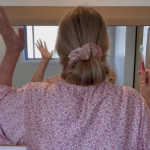Growing Pains: Growing, Growing, Gone!

 So how many of you have been woken during the night to the sounds of tortured screaming from your child’s room? Your heart races as you sprint down the hall, briefly wondering whether you should pick up a weapon on the way so you can fend off the obvious assailant who is attempting to torture them right under your very roof, only to discover them totally alone, writhing in bed, grasping their legs. In your confusion and fatigue they scream at you “my legs hurt!” WHAT? You woke me for GROWING PAINS (and not the sad 80’s sitcom either)!!
So how many of you have been woken during the night to the sounds of tortured screaming from your child’s room? Your heart races as you sprint down the hall, briefly wondering whether you should pick up a weapon on the way so you can fend off the obvious assailant who is attempting to torture them right under your very roof, only to discover them totally alone, writhing in bed, grasping their legs. In your confusion and fatigue they scream at you “my legs hurt!” WHAT? You woke me for GROWING PAINS (and not the sad 80’s sitcom either)!!
For some children it is not so extreme but for many growing pains can be a very painful experience, for child and parent. So what are they?
Growing pains are defined as muscular type pain in both legs especially in the calves, behind the knees and the front of the thighs. They are worse in the early afternoon and evening, with some children waking in pain during the night. They can start as young as three years of age and usually resolve by the early teens and they don’t discriminate as they present equally in boys and girls.
Their cause is unknown and despite the name “Growing Pains” they are not believed to be associated with the growth of bone.
Three possible causes of growing pains include:
- Poor Posture – poor posture results in greater strain on the support muscles of the body when children are performing simple tasks such as walking, running and playing. It has been surmised that children with flat feet may be more likely to suffer from growing pains.
- Muscle Fatigue – overuse of muscles with excessive running, climbing and jumping is believed to be a contributory cause to growing pains but obviously not the only one as many very active children never suffers from growing pains.
- Emotional Stress – stress may increase tension in muscles resulting in growing pains but this is not very common.
What to look for to confirm your child has growing pains:
- The pain is present in both of their legs, usually the calves, front of the thighs or behind their knees;
- The pain presents in the afternoon, early evening and can wake them at night;
- The pain is gone by the morning;
- The pain can occur every night for a couple of weeks, once or twice a week or just occasionally;
- The pain does not change with movement of the leg;
- There is no associated limp which impacts on them performing normal activities such as walking, running or playing;
- There is no associated fever;
- Occasionally they may complain of headaches or arm pain.
When to consult your health care professional:
- If the pain is in one limb or associated with a limp or difficulty performing normal childhood activities;
- If the pain continues through the day;
- If there is an associated temperature;
- If there is redness, swelling or a rash present;
- If you have any concerns.
So you feel comfortable that your child is suffering from growing pains, now what to do to ease the night time torture for them and for you.
Below are some suggestions to ease their pain:
- Massage the involved limbs. You can use specialised massage oils or creams to help the muscles recover as well as minimise friction to their limbs.
- Apply heat to the muscles which helps relieve the spasms.
- Stretch their limbs – every day to lengthen the muscles and gently during an episode of discomfort to ease their pain.
- Use pain medication such as paracetamol if pain is severe.
- Make sure your child is drinking enough water during the day, 4 – 6 glasses is the recommended intake, to keep the body well hydrated.
- Feed the muscles with good nutrition. Magnesium has been shown to have great success in treating cramping type muscular pain. Increase foods rich in magnesium such as cashews and nuts, potatoes, bananas, lentils and green vegetables and minimise sugary foods and soft drinks that deplete the body of magnesium.
- If the cause appears to be from emotional stress discuss what is upsetting them and how, together, you can improve the situation.
- Consult your local chiropractor to have your child’s posture assessed and if necessary referred to a podiatrist to correct poor feet biomechanics.
- Give lots and lots of cuddles and reassurance that they are ok and it will end. Cuddles always help.
Growing pains can cause lots of distress to your child and your household (especially when sleep is lost) but by following the advice above you will hopefully minimise this distress and you will all be enjoying uninterrupted sleep again very soon.
Dr Lorraine Scarr is a chiropractor with more than 10 years experience. She is the owner of, and sole practitioner at, The Chiropractic Works Dulwich. Her passion is to provide effective and holistic care to all family members but with particular focus on Obstetric and Pediatric care, including Birthing Skills Classes which you can find more information at http://www.chiropracticworks.com.au/pages/classes.php
She is married to David and the proud mother to their beautiful daughter Elysia.
For more information please visit http://www.chiropracticworks.com.au
Facebook: http://www.facebook.com/pages/Chiropractic-Works/183310241699400










